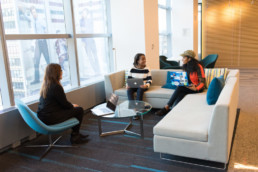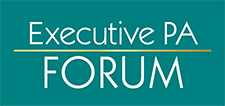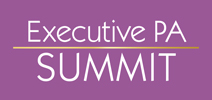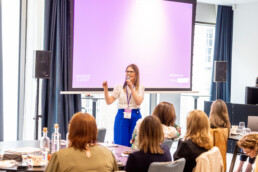REPORT | Executive PA Summit 2023
We hosted our annual Executive PA Summit in the fabulous newly opened Dublin Royal Convention Centre on Thursday 4th and Friday 5th of May.
Excitement for the event had already been building as we launched our event app in advance which was provided by one of our partners for the event, CrowdComms.



As attendees entered the Convention Centre that morning, they were greeted by our swanky registration kiosks. Myself and Aisling were delighted to have a break from preparing last minute name badges the night before! The registration was seamless, and, of course, we had Stuart and Ronan from CrowdComms to hand to help anyone who had issues with accessing the app or getting their name badges printed.
The Dublin Royal Convention Centre sponsored a gorgeous early morning spread for us as we got ready for the day ahead.

Keeping with our environmentally-friendly conference theme using our bespoke event app, we once again distributed a Rocketbook for 'everyone in the audience' at this year's Summit. Rocketbook is the world’s first endlessly reusable notebook. With a Rocketbook, you can take notes as normal, then using the free companion Rocketbook mobile app, save your notes digitally. When finished, simply with a damp cloth wipe your notes clean to start taking notes again. A single Rocketbook notebook can be reused for years, saving a massive of amount of paper waste compared to traditional notebooks that need to frequently be replaced!
So onto our first speaker of the day - Janice Valentine - who talked us through her very personal journey, one of transformation driving change as an EA and making purposeful impact in your organisation and career.
 Janice spoke candidly about how circumstances from her personal life motivated her to create a new pathway along her career journey.
Janice spoke candidly about how circumstances from her personal life motivated her to create a new pathway along her career journey.
She talked us through all the steps for how to implement a hackathon within your organisation and gave us some detailed insight into the workings of how to host and manage one. A major talking point was Janice’s list of questions that you should ask yourself (with a couple of hours time put aside) if you are looking to make purpose, impact or change in your life.
Janice finished her talk with a question for the Executive PA Summit tribe.

We knew our next speaker was going to give a great boost to all our delegates however we had no idea of the impact that Jean Evans would make on the room while talking through the topic of networking!

As we had said in the bio outline, networking is not something that you regularly see on the job spec of an Executive Assistant or Business Support professional. However, Jean spoke about thinking of networking in terms of confidence, connection and communication. That really resonated with the audience. Jean had so much practical advice and techniques to share that when we run over time we really didn't want to tell her to stop.
Jean gave so much advice during her talk that it is hard is actually quite difficult to summarize the main pointers here; however, one particular statistic that Jean shocked all of us with was this one:
"Working hard accounts for 10% of your career progression.
The remainder is down to image and exposure."

That statistic really hit home with everybody in the room, and once we heard it, we consumed all the advice that Jean imparted.
Jean led us into the first networking break of the day which was a delicious spread, once again, from the Dublin Royal Convention Centre.
Delegates had the opportunity to go and visit the sponsors stands, enter competitions, play some fun challenges via the event app, network with old friends and connect with new acquaintances.
The last thing we ever thought we would have at the Executive PA Summit was a quote from a Kardashian, but Siobhan Kelly delivered that quote as part of her presentation. Siobhan - founder of Mosaic Consultancy and our Platinum Recruitment Partner - gave us an honest and frank update on the status of the Recruitment industry and how the job market looks at the moment - in particular, hiring trends in relation to the business support profession.

The message here was that you should prepare yourself now if you are thinking of a career move - look at upskilling and training to prepare yourself for future moves and opportunities. Yes, things are stagnant at the moment. Yes, the job's market is slow moving. Yes, there are worries about job security - however, with Siobhan's advice, everyone in the room felt reassured and motivated for the future.


Our next talk was delivered by way of a 'double act' - we had Oz Desai and Matthew Heymans of our FCM Travel, our Platinum Travel Partner. Oz and Matthew got us up to speed with how current travel trends are looking - in short, travel is back with a bang!
Oz and Matthew talked through the major travel challenges that corporate travellers are facing at the moment, with the pace of travel so quickly back to what we were used to pre-pandemic, as well as how FCM can help alleviate those headaches.
They also discussed sustainability in corporate travel and how they can support their customers to travel efficiently, reducing the carbon footprint and offering a solution that has everything the corporate traveller needs, all in one place.




Our next speaker up was Therese Phipps, friend of the Forum, who delivered a workshop last year on the six universal needs. That went down so well that we invited Therese back to join us this year to talk about the six universal needs and how we could implement them at work and be mindful of them, considering the various personalities we engage with on a daily basis, be that ourselves or our colleagues.
Therese shared with us the six universal needs that every single human being has to varying degrees - for each need there are some times in our lives when certain needs are greater than others. Therese talked us through the various elements of each area so to know ourselves better and those around us.
Jean Evans joined us on stage again to answer some questions from her previous session and to also facilitate a short networking session that led us into the lunch break.
Once again, the Dublin Royal Convention Center provided some delicious lunch options for everybody who attended. It was also great opportunity for networking with sponsors find out more about what they do how they can help our delegates.
 Our next our first speaker after lunch was the indominable trailblazer Sandra Healy who is the CEO and founder of inclusio. Sandra was also the founder of the DCU center for diversity and inclusion, etc. Ever since, Sandra has had a varied career and has worked across a number of large well known companies and organizations. Early on in her career, she became involved in a mission to promote members of her workforce who came from disadvantaged areas as well as promoting diverse neuro-divergent multicultural workplaces. Sandra is also very passionate about gender equity in the workforce, and she gave us some interesting stats and figures in the area of gender diversity which was a real eye-opener for everybody present. Sandra's main mission is to affect change in organizations so that there are greater diversity greater voices being heard greater number of voices being heard which is also better for business. Our delegates were privy to some interesting stats and also soaked up Sandra's advice for how each of us cn approach a D&I conversation in the workplace.
Our next our first speaker after lunch was the indominable trailblazer Sandra Healy who is the CEO and founder of inclusio. Sandra was also the founder of the DCU center for diversity and inclusion, etc. Ever since, Sandra has had a varied career and has worked across a number of large well known companies and organizations. Early on in her career, she became involved in a mission to promote members of her workforce who came from disadvantaged areas as well as promoting diverse neuro-divergent multicultural workplaces. Sandra is also very passionate about gender equity in the workforce, and she gave us some interesting stats and figures in the area of gender diversity which was a real eye-opener for everybody present. Sandra's main mission is to affect change in organizations so that there are greater diversity greater voices being heard greater number of voices being heard which is also better for business. Our delegates were privy to some interesting stats and also soaked up Sandra's advice for how each of us cn approach a D&I conversation in the workplace.

We were delighted to have Niamh Moynihan join us at the Summit to speak about how we can all achieve a better workday.
Niamh believes that you can achieve career success without compromising your well-being or suffering from burnout and shared many practical tips that we could implement straight away.
She gave top tips for how to reduce firefighting in your day-to-day, and work to eliminate it for good by pre-empting the fires that could be started before they do, and the importance of looking to the source of those fires, so perhaps a new way of working together could be introduced.
The one question you should ask, if you are feeling overwhelmed, or burdened by tasks that others are lumping on your plate - will instantly shift your mindset - what if it could be easy? Do you have a project or task that is weighing you down right now? What if it could be easy? How would things look for you?
Niamh finished her presentation by setting a challenge for everyone in the audience - to job swap (or at the very least task swap) with your Executive/manager or a colleague on your team. Her reason for encouraging people to take up this challenge is so that you have an insight into your colleagues pressures and vice versa. We can't wait to hear how many of our delegates have tried this and what they have learned as a result!
 Leading us into the last break of the day we heard from friends of the Forum, Madeline Riley and Lorraine Allis, who were representing the Radisson Blu Royal Dublin Hotel and our Venue Host and Sponsor, the Dublin Royal Convention Centre.
Leading us into the last break of the day we heard from friends of the Forum, Madeline Riley and Lorraine Allis, who were representing the Radisson Blu Royal Dublin Hotel and our Venue Host and Sponsor, the Dublin Royal Convention Centre.
 Lisa Boissel, CEO of Miss Jones UK and Co-Founder of Miss Jones Ireland also said a few words in advance of the inaugural Miss Jones Ireland EXPO taking place that evening.
Lisa Boissel, CEO of Miss Jones UK and Co-Founder of Miss Jones Ireland also said a few words in advance of the inaugural Miss Jones Ireland EXPO taking place that evening.
Last but by no means least we welcomed Dr Heather McKee - Europe's leading behavioural change specialist - to finish out the day with a bang. Heather's subject of expertise focusses on developing sticky habits ie habits that stick! Dr McKee imparted some great advice for how we can all create lasting change by introducing realistic, laughably small changes in our day to day, for which we can gradually build upon to form lasting habits.


Her main piece of advice when it comes to habit formation was to focus on Implementation not Information. We tend to be so heavily armed with information when it comes to being more productive, healthier and fitter - but it is the small choices we make each day, and small action steps we take that will eventually lead to sticky habits sticking!
On Day 2 - workshop day - we hosted a range of intensive workshops which received stellar feedback, from Design Thinking for Executive Assistants to the A-Model for Communication, a variety of pertinent learning and development was covered.
I was lucky enough myself to join Jarlath Duffy's Time & Energy Management workshop. Through a mix of storytelling, practical advice and giving us the space and time out to reflect and work through the worksheets he gave us, we had many a-ha moments throughout. We left the workshop with a renewed sense of motivation for managing our time and energy better.
I'd like to take this opportunity to say a huge thanks to everyone who attended, who contributed, asked questions and who made the event such a special one by engaging, interacting and connecting with others.

Also, a massive thank you to all our Sponsors & Partners who provided some amazing prizes and without whose support we simply could not host the Executive PA Summit:
Radisson Blu Royal Hotel Dublin
Dublin Royal Convention Centre
Alan Rowlette - who captured some amazing shots of the conference throughout the day, some of which are dotted through this article
We are already planning our 2024 Summit and hope to announce dates for that by early Autumn.
If you missed the 2023 Summit but would like to purchase a copy of the recording, please contact Aisling aisling@executivepaforum.com
You can also view our video highlights from the 2023 Summit here!
Looking forward to seeing you at the next one
Fiona
Procrastination and its Links to Perfectionism
Procrastination and its Links to Perfectionism…Plus 7 Simple Steps You Can Take to Banish Procrastination for Good (feat. guest Roseanne Connolly)
Is procrastination just another word for a lack of willpower or getting your priorities right? Or is it the result of high standards and perfectionism?
On the surface, procrastination may seem to be an action compelled by apathy. However, once we look deeper, it’s clear that this issue is more complex than it seems.
We’ll be taking a look at the psychology behind the issue, as well as advice for how to overcome procrastination, with insights from Roseanne Connolly, Chartered Company Secretary & Governance Professional, and the current APAI Executive Committee Chair.

The Psychology of Procrastination


Perfectionism is often suggested as the root cause of procrastination. The idea is that the perfectionist fears being anything less-than perfect, and therefore will often put off this task to which they’ve attached an impossibly high standard.
Studies into the link between perfectionism and procrastination have had varied results. For example, this article purports that the link between perfectionism and procrastination is a myth. However, there are a number of studies that refute this notion: for example, this study (albeit related to academic students), highlights the positive correlation between procrastination and perfectionism.
Another study also contains findings that argue for the procrastination-perfectionism relationship, detailing the ‘discrepancies’ between how a person views themselves, and how they think they should be. The researchers’ findings indicate that individuals with wider ‘discrepancies’ tend to procrastinate more, as they assume they will not achieve the standards they have set out for themselves: ‘The perception of falling short of one’s own standards does not bolster task-approach; rather, it triggers procrastination.’ It’s a sort of all or nothing mindset: if I can’t do it perfectly, what’s the point?
In Roseanne’s experience, there is a definite link between the two. ‘I can only speak for myself but have met others with similar behaviours. I try to design/imagine the most perfect, effective, efficient outcome and then I re-design and improve. This all happens in my mind though. The task/event is then procrastinated because of 1) the pursuit of perfection and b) being a procrastinator!’
What’s more, we know that putting off a task often involves completing another less urgent task in its place. While this is purely anecdotal evidence, it supports the idea that apathy isn’t necessarily what’s really going on here.
Present Self vs. Future Self and Immediate Gratification
The disconnect we feel between our present selves and our future selves is one of the biggest hurdles in reaching our goals. A classic example of this is the infamous marshmallow test, in which children were given one marshmallow, and told that if they refrained from eating it, they would get a second one after fifteen minutes. As expected, many of the children (2 out of 3) couldn’t resist the temptation, and gave in to the immediate gratification of eating their one and only marshmallow. Here we see a clear example of people prioritising their present selves and sabotaging future goals and long-term benefits.


Reassuringly it’s a human tendency to seek immediate gratification and to struggle with self-control, so we needn’t feel ashamed of our procrastinating ways. If we’re looking to change our habits, however, understanding the ‘why’ behind our behaviour is the first step.
Once we do this, we can reconcile our future selves with our present selves and begin to break the habit.
The Pros and Cons
There are some positives we can glean from procrastination. For example, many of us thrive under pressure, and if procrastination is good for anything – it’s for turning up the heat.
While Roseanne can find some benefits to procrastination, ultimately she deems it as less than effective: ‘The only positive aspect I can think of is that the delay sometimes allows more information to come to light which can be helpful. Overall, I would recommend not procrastinating.’

It’s a safe bet to say that most of us would agree with Roseanne. Let’s face it: procrastination usually makes us feel bad. Even though we’re obtaining the instant gratification of not having to do the task at hand, putting off an important task only worsens the feelings of anxiety, as we now must feel anxious about not getting it done in time. Another shortcoming of putting things off is that you may not leave sufficient time to deal with unexpected roadblocks that may crop up closer to the deadline. As event and project managers we know this all too well and it’s always a good idea to allow for contingencies should things not go to plan.
Simple Steps to Overcome Procrastination
Understanding the cause of procrastination, and recognising the drawbacks will set you on the right path to breaking this habit. Here are 7 simple steps you can take to change your ways:
- Increase the chance for immediate rewards and/or immediate consequences. For example, a long-term benefit of exercising might be to lose weight, whereas a short-term ‘reward’ of exercising is better sleep. Conversely, an immediate consequence here might be that choosing not to exercise today will mean you won’t sleep as soundly tonight. Another approach is to incorporate something you enjoy into the task that you’re dreading, for example listening to your favourite podcast while you clean the kitchen.

- Obtain a deeper understanding of how your decisions in the present will affect you in the future.
- Recognise that the cons of procrastination outweigh the pros, as detailed above.

The biggest hurdle for many people, and especially for procrastinators, is getting started. This tends to happen as we build up a task in our heads, making it out to be more tedious or time-consuming than it will be in reality. How many times have you started something and thought, ‘this isn’t as bad as I thought it would be’?
You can mitigate this by carrying out any or all of the following steps:
- Make starting easier, e.g. having an easily accessible and tidy workspace, ensure you have the necessary software installed, etc.
- Obtain a deeper understanding of how your decisions in the present will affect you in the future.
- Make your ‘start’ as effective as possible. This will be different for everyone. Some will prefer to start with the easiest task, some will prefer the hardest – there are pros and cons to each. [Check out Brian Tracy’s Eat that Frog book for more on that]. Starting with the most straightforward of tasks eases you into your workload, and allows you to shorten your to-do list easily, leaving the remainder of the work seem less intimidating. However, this does mean that you have all the difficult tasks to ‘look forward’ to afterwards. Kicking things off with the hardest task can be draining, leaving you demotivated to continue with the rest of your workload enthusiastically. However, it gets the worst of it out of the way quickly…the most important thing here is to find what works for you, what causes the least amount of anxiety and ultimately gets you to your end goal faster
Just as procrastination becomes a habit, avoiding procrastination is also a habit that you need to develop. Taking small steps and applying the guidelines mentioned in this article to your daily working routine is a good strategy to begin to form more efficient habits that will last a lifetime.
Roseanne Connolly will be speaking at the Executive PA Forum 2020. Read more about the details of her talk, as well as info on the rest of the speaker line-up here: https://bit.ly/3dpK8kQ
References:
Psychologytoday.com – Procrastination and the perfectionism myth
SMART Working (Part 2)
Following from the positive feedback we received on the SMART Working blog we posted before Christmas, we are delighted to bring you another one chock full of more advice and tools to expand your repertoire and equip you with a first-rate working routine!
Supportive
As an assistant, you are the backbone of your organisation. The core of your work revolves around providing support to your boss and your company.
It goes without saying you’ll need to know your boss’ needs, as well as those of your organisation as a whole. Pre-empting those needs will bolster your standing as a supportive team member – stepping up before you’re even asked demonstrates your savviness and initiative. And this will pay dividends for your career in the long run.
Aligning your values and goals with those of your boss will also be integral (keep reading for more on that).

Self-reliant
Seeking approval and relying on others to make your decisions for you can be time-consuming, and what’s more, it can stunt your personal and professional growth.
Think about it: how much do you really learn from situations in which you pitch ideas, but leave the ultimate decision to someone else? Compare that with how satisfying it feels to make that final decision and reap the rewards, nerve-wracking as it might be to put yourself out there.
We encourage you – no wait, we dare you – next time you are in a meeting and your gut instinct screams at you the best direction to go in – choose to be the one to take responsibility and make a decision on it.
While it’s undoubtedly necessary to incorporate teamwork, collaborate and listen to the opinion of others – or indeed ask for help at times – self-reliance is essential for you to excel in your role.
Multi-tasker
This one will most likely sound obvious, but the challenge here is achieving a balance between handling several tasks at once, and giving sufficient care and attention to each of these tasks.
Multi-tasking has its share of critics these days, and it’s easy to see why. When juggling multiple responsibilities, we can have a tendency to switch our focus from task to task hastily. This ‘task-hopping’ can be quite frenetic, and often leads to us feeling overwhelmed, seeing a decrease in productivity and of course there’s a bigger chance of making mistakes.
The secret to avoiding these obstacles is in the planning. Before you start working through your to-do list, work out when and where you’ll need to manage your attention and concentrate on one project at a time. (see S.M.A.R.T. Working Part 1 to read about attention-management). There are probably many tasks that you know will need an extra level of concentration, so these can be earmarked ahead of time. On the other hand, there are also numerous tasks that you could do in your sleep, and these are good candidates for the multitasking list.

Mindful
It’s a trendy buzzword that’s been thrown around a lot lately, which may be off-putting for some. But the truth is, mindfulness brings a lot of value to our lives, and to our work.
Mindfulness is all about being present in the moment and remaining conscious of what you are doing. It can be easy to slip into auto pilot, especially with more repetitive and routine tasks. But as your mind wanders to what your weekend plans are, your awareness of the job at hand decreases, which can lead to mistakes and losing track of what you’ve already completed.
Research shows that mindfulness in the workplace can lower stress and improve performance – hence why it’s so popular!
In order to make your life a little more mindful, find out if there are any courses running near you – if not, the internet has a plethora of resources on this topic, and we will have Elizabeth Whelan, Mindfulness expert running a workshop at this year’s Executive PA Forum.
Authentic
Being your authentic self is a fundamental aspect of fostering a good relationship with your boss. Honesty and integrity are the two cornerstones of authenticity, and this will involve remaining true to yourself, and to your Executive.
Start by establishing your values and goals, as well as what you need to do to make them a reality. Note how these attributes align with those of your boss and your company. Coordinating your vision alongside your Executive makes for a harmonious and progressive relationship.
This will also provide you with an invaluable learning experience. The Executive Assistant is the perfect role for anyone who wants to understand the complex inner workings of a business.
If you feel your values don’t align with your organisation or your boss, it is advisable you look to move to somewhere that does. Numerous studies show that if you are not living and working in a place that is true to your authentic self and your values then your energy is severely depleted, you will become ill, resentful and no doubt, miserable.

Autonomous
Being an assistant requires a certain amount of give and take, particularly when it comes to initiative. You need to know when to take the reins, and you also need to be savvy as to when your boss should be giving you more autonomy.
As mentioned in SMART Working Part 1, it’s important for you to be allowed to deal with the management side of things so that your boss can focus on leadership. This means that your boss will need to give you a sufficient amount of autonomy so that you can take on managerial responsibilities and make managerial decisions. Embrace it and remember that you are capable of anything you put your mind to.
Asking Questions
‘There’s no such thing as a stupid question’, is an expression that has been uttered so often, it tends to lose meaning. However, it’s easy to see why this phrase is so commonly-used. Many of us are hesitant about asking questions at times, for fear of coming across as incompetent or incapable. We sometimes think we are expected to know everything, however what you must remember is that everyone that you work with brings their own unique set of skills to the table. There are plenty of areas where you would excel where others would fall down and vice versa.
Bottom line, you are all in the organisation to do the best job you can, so it’s important to remember that if you have to ask, there’s a good reason for it – and don’t feel like you have to apologise.
Feeling too afraid to pipe up and clarify things can result in misunderstandings about the task at hand, or uncertainty about what is expected of you. It’s much safer to admit early on if you’re stuck on something, than to get the wrong end of the stick and follow through incorrectly.
Resilient

It’s something we can all agree on – an assistant’s role could never be described as an easy job and it is not for the faint-hearted.
As you are the backbone of the business, this is a demanding role that ensures everything runs smoothly for everyone else. With this in mind, you’re bound to have moments where you feel you are going to crack under the pressure.
It’s important to remember that these are not moments of weakness, and they are not an indicator that you are lacking in ability. What demonstrates considerable strength in an assistant is acknowledging and then overcoming these adversities. Possessing the ability to bounce back after a difficult process, say, receiving some tough criticism or feeling stressed about a deadline, shows that you are steadfast and dedicated.
Being a great assistant doesn’t mean having zero bad days. What’s important is that you are able to get through these bad days and come out on the other side stronger and fresh with new learning experiences.
Resourceful
Simply put, this is about using the resources that are available to you in order to reach your goal.
Being creative is key here – any great assistant will use their ingenuity in order to come up with the solutions to complex problems, not to mention consulting your contacts book for the ones that are last minute. A resourceful person won’t necessarily have all the tools and knowledge necessary immediately at their disposal, but they will know how and where to find them. You can also use your previous experiences to help you solve problems, or even prevent them.
Trustworthy
Every well-functioning relationship is built on trust, one that is particularly necessary between the executive and the assistant.
A significant part of your role involves having responsibility for handling sensitive information, and completing complex tasks that are intrinsic to the smooth running of the business. Your boss needs to know that they can entrust you with these responsibilities without having to check up on your progress, or worry about significant errors being made.
Show your boss that you can walk the walk when it comes to managing these crucial duties. Not only will this strengthen your relationship, you may also receive the added bonus of being granted a wider range of responsibilities.
Training (& Skilled)

Ask any stellar assistant in the business about their working ‘formula’, and you can be sure it will include regular, quality training. Yes, you will learn a lot on the job, but there is so much that can be taught in an external setting by industry experts. These professionals have been in the industry for years, and they’ve seen it all. Networking with a plethora of assistants and executives from a wide variety of organisations will provide you with insights that you may not come across in your job. Since they don’t work in your organisation, they can offer you a new perspective on your role.
Training should be a regular occurrence throughout your career. Whether it’s upskilling or refreshing something that you’ve previously learned, we recommend incorporating some training into your schedule at least once a year. This ensures that your skills and knowledge stay fresh, and it also gives you enough time between training sessions to practise your new-found proficiencies.
The Executive PA Forum on May 20th 2020 will provide you with training that will help you to excel in your career as an assistant. With a host of expert speakers and coaches to guide you, this career-development opportunity will provide you with new insights and skills, such as:
- Developing a High Performance Mindset for Today’s Assistant
- How to Align Your Goals With Those of Your Executive and Organisation
- Building Resilience into Your Psyche
- Learning to Overcome Impostor Syndrome
- Keep Calm and Keep Going – Adaptability & Responsiveness Tools for the PA
- Building new and current EA capabilities
- Escape Your Cage – Banishing Impostor Syndrome
Workshop day on May 21st delves deeper into topics that include:
-Mastering Productivity as a PA/EA and Stepping into Your Full Potential
-How to Avoid Burnout
-Identify Your USP: Aligning Skills, Strengths and Values to Accelerate your Career in the Right Direction
Register for the Executive PA Forum today by clicking here!
We are also delighted to welcome Adam Fidler back to Dublin on the 22nd of May with his course for assistants – another excellent option if you’re looking to expand your expertise. Contact us for more info.
If you haven’t already, be sure to check out Part 1 of this blog for even more ways to ‘Work SMART’, and let us know what you think!
Incorporate SMART Working Into Your Routine

Many of you in support roles are going to find yourselves overextended, stressed, and perhaps overwhelmed at times.
You are most likely familiar with the ‘SMART’ formula for goal setting, which is particularly popular this time of year, and we think it’s time to wind down after a hard year of work instead of putting extra pressure on yourself!
Having listened to a lot of you in our network talk about how you stay motivated, we’ve jotted down a SMART working guideline to hopefully keep you inspired now and into the New Year!
Self-starter
It’s a term that you will often see in job descriptions and on C.V.s, which means that it is a very in-demand attribute. Self-starters are motivated to get things done without being told. You are observant and spot the things that need to be completed, without the need for direction from your seniors. This may feel challenging and uncomfortable at times, but you will likely come to enjoy the rush of taking matters into your own hands.
See Ahead
Seeing and looking ahead to know what lies in front of you is a powerful tool. For example, arming your manager with as much information they will need to know before an important meeting will set them up for success. It could be some extra details about the other people in the meeting, some background information on their business and how the relationship could be mutually beneficial – these are the valuable nuggets that ensure your boss is fully prepared and will help them – and you – excel.

Manager Mindset
Supporting your boss is your main objective. Therefore, you’re aware of their goals and needs so that you can provide appropriate assistance. While they work on the strategic end of things, you think operationally to ensure everything runs smoothly. You are their backbone which means they can focus on delivering the ‘bigger picture’ vision of the business. This will also involve your taking on more managerial duties and decision-making. EA & PA Coach Adam Fidler asserts that when an assistant acts ‘as a junior- or middle- manager in their own right’, their boss is free to deal with the ‘leadership’ aspects of running the business. Read more from Adam here.

Methodical
Whether you’re a ‘plan ahead’ kind of worker, or more of the ‘take it as it comes’ variety (according to our most recent poll, it’s no surprise the majority of you are planners!), having a clear structure will ensure that you don’t miss anything important and that you have a solid blueprint of how your time will be spent. You’ll get pulled and dragged in many different directions on any given day so having a roadmap to get back on track will be hugely helpful and keep you calm.
If you’re finding it difficult to bring some method to the madness, start with prioritising your tasks. Determine the level of urgency of each of them, complete them in that order, and concentrate on one task at a time – which leads us nicely to…
Attention-management
Time-management’s trendier cousin is the new term on everyone’s lips at the moment, and for good reason.
Centred around being more proactive than reactive, attention-management involves deciding what to focus on instead of reacting to every distraction that comes your way. It involves controlling your attention and focus by choosing what you pay attention to, instead of allowing yourself to be put off course by unwelcome interruptions.
Our advice for managing your attention is to set boundaries with your colleagues by letting them know when your door is open, and when it isn’t (metaphorically or literally). Also, it might sound a tad obvious, but headphones are a really great piece of ‘do not disturb’ equipment as people become more aware when they approach you that they are interrupting you.
Doing these things will allow you to minimise disruptions to your day and keep your head down when necessary. You’ll also know when these disturbances are most likely to come your way, so you can be prepared. According to numerous studies, practising mindfulness also helps to focus your attention where it is needed the most (see above!)

Act Now
Procrastination is one of our worst enemies when it comes to ‘smart working’. Sometimes we tend to overthink things if they are left to sit with us for too long – so although asking your boss for that week off next month seems intimidating now, it will be much more intimidating in a few days. A useful hack for work, and for life in general, is to immediately complete any tasks that will only take a few minutes. Even the smallest of tasks can end up seeming huge when they’re left to fester in our minds, so getting them out of the way promptly means that your mind will be clearer for the bigger tasks on your list.
Rework
If it’s not working, change it.
Sometimes we can get stuck in a routine, becoming so accustomed to a certain way of doing things that changing it up seems like too much extra effort. The thought of approaching a new and unfamiliar method can seem daunting, as you have to implement it, practice it, and become familiar with it – much more time-consuming than simply sticking to a routine that you could do in your sleep.
The time you put into this process, however, will save you a lot of time and energy in the long run. A few weeks of slogging through the learning process will mean many more weeks of a better, more efficient routine.
Reward Yourself
Good work deserves a good reward, whatever form that may take for you. It can be as simple as going out for lunch with your coworkers, or on the more extravagant side of things if you’ve just finished a particularly arduous project. Whether they’re big or small, rewards will not only help increase your productivity, they will also boost your morale.
Time-management
You’ve seen this trait on many a list already, the reason being it is highly important for an effective assistant’s working strategy. If your office tends to be busier on Wednesday afternoons, set aside some extra time in your plan to allow for this, and plan in work that doesn’t require your full focus. Try to give yourself some breathing room, too – you never know what unexpected deadline or project might pop up amid your hectic week, and if your schedule is too rigid, you may find yourself floundering.
Tenacious
This is a quality that many employers value. That’s because a tenacious employee is ready to commit to completing their work to the best of their ability despite any obstacles they may come across. We’d love it if everything was simple and straightforward, but you have will tough days at work, and your determination will be one of the biggest driving forces that will see you through to the other side.
Great assistants are going to work hard; it’s the nature of the job. So, instead of saying ‘work smarter, not harder’, we say ‘Work hard, but be smart about it’.
How many of these do you think you already practise, or could start implementing in your daily routine? We’d love to hear from you!
The Impact of AI on the Role of an Assistant (And How to Embrace AI in Your Career)
When you think of the phrase ‘Artificial Intelligence’, what comes to mind? A few years ago, it most likely would have been a dystopian science fiction novel or a futuristic video game. With huge technological advancements in recent years, however, it’s clear that Artificial Intelligence is not just fiction – it’s fast becoming a reality. This has led to growing concerns about the negative impact it could have on us, and our jobs.

First Things First: What Exactly is Artificial Intelligence?
While the answer to this question could fill a blog post of its own, we’ll try to keep it as concise as possible.
AI involves creating and developing machines and software that can perform tasks that usually require human intelligence, such as speech recognition and decision making. AI learns from experience and previous data using a process called deep learning.
Natural language processing is just one of the areas in which AI has made leaps and bounds, which is why smart speakers such as Amazon Echo are getting better and better at understanding us. There have also been significant advancements in narrow artificial intelligence, whereby a machine performs a given task better than a human does. This type of intelligence is concerned with one particular task, which is often structured and repetitive – dissimilar from the more general artificial intelligence often depicted in science fiction.
AI has spread to numerous areas of our lives, some of which we may not even be aware. Take your Netflix and Amazon recommendations, for example – that’s the work of AI. What you see on your social media feeds and the notifications you receive from social media platforms – all influenced by AI.

What Impact Will This Have on My Job?
While we certainly haven’t created a machine with the intelligence level of many of the androids depicted in movies and video games, we have developed certain aspects of AI to the extent that it has already made a significant impact on many workplaces.
A survey by Gartner found that 37% of enterprises now use AI – this is an increase of 270% in the last four years. (Source: Gartner)
AI is quickly encroaching on certain fields, for example customer service. By 2020, a projected 85% of interactions with customers will be managed without a human, therefore chatbots will take over a large share of work in the customer service field. (Source: The Innovation Enterprise)
The rising usage of virtual AI assistants such as Apple’s Siri or Microsoft’s Cortana certainly makes it seem as though the roles of human assistants could eventually be at risk, too.

However, this doesn’t mean that you need to be worried about being replaced by a machine any time soon.
In his book ‘Life 3.0: Being Human in the Age of Artificial Intelligence’, physicist Max Tegmark provides advice for future-proofing your job. His recommendation is to avoid roles with repetitive tasks and opt for professions that involve using innovation and creativity, communicating with other people and dealing with unpredictable environments. (Source: Irish Times)

Sound familiar? That’s because these are all traits inherent to the role of an assistant.
Working with people is a fundamental aspect of the job. The emotional intelligence required as an assistant is something that machines simply cannot replicate. Building strong relationships with your boss, colleagues, and clients and forming a mutually supportive network is key to helping you strive in your career, and helping the organisation’s effectiveness. Likewise, empathising with others and understanding how emotions affect behaviour and performance at work will make you a better employee and co-worker.
Using creativity to solve problems and deal with the unpredictable nature of the role is another important aspect of this profession.
Assistants also need to be prepared to execute any task that is thrown at them. Flexibility is an essential trait of any good assistant, and as machines have only been developed to use narrow artificial intelligence (i.e. carrying out one set task), this is another area in which technology won’t be outrunning us any time soon.
What’s more, Ben Pring, co-founder of Cognizant’s Center for the Future of Work, advises that only certain tasks within roles ‘are likely to be automated’. (Source: monster.com) This means that AI will most likely just take over certain more repetitive aspects of your role, leaving you free to concentrate on other, more important tasks.
Our Tips for Embracing AI in Your Career:
The influx of artificial intelligence into the workplace may feel like a cause for concern, however, it’s a great tool to have in your arsenal.
 To get you started, here are just some programmes and software that you may find useful in your role:
To get you started, here are just some programmes and software that you may find useful in your role:
Virtual Assistants such as Apple’s Siri will help you quickly complete internet searches, set a reminder in your calendar, or make a phone call, all while barely lifting a finger.
‘Respondable’ from Boomerang uses AI to suggest improvements for your emails as you write them.
Any assistant knows that dealing with highly sensitive information is part and parcel of their job. ‘CheckRecipient’ is a software tool that will prevent this information from being emailed to the incorrect address by analysing previous email data.
‘Spoke’ allows organisations to create a knowledge base that the programme will then use to answer employees’ questions regarding anything from paid time off to computer troubleshooting – similar to a chatbot.
Hotailors allows users to submit, review, and expense business trips efficiently.
Eva by Voicea will provide a transcript of your conference calls and meetings for you, as well as audio and video recordings. You can use voice commands and customisable trigger words to highlight specific ideas and actions.
As Artificial Intelligence is such a complicated and vast subject matter, you don’t need to get too bogged down in all the details, however, be sure to research any programmes or software that you may use, to ensure that it is the right fit for you, your job and the organisation.
There are also some great resources on the net that will help you stay on top of trends and news in the world of AI.
For example, Adobe and Forbes provide insightful articles, and Gartner’s surveys offer some excellent insights into AI trends. Wired.com is another great resource to help keep up to date.
So yes, the robots are coming, but we advise you to use them to your advantage!
The Traits of a Great Assistant – How to Excel In Your Career

The role of an Assistant is vast – any Personal and Executive Assistants out there will scoff at the idea that their job is merely a simple 9 – 5. Long days are part and parcel of the role, and that’s just one of the factors that contribute to making this a demanding profession that requires an ever-growing list of skills.
EAs and PAs are required to be at their boss’s beck and call, making sure everything runs smoothly. They must be excellent all-rounders, completing a wide variety of tasks to a very high standard.
If you’re an Assistant, you’ve probably already read a countless number of blogs and articles with advice on how to be good at your job. Possess good communication skills. Manage your time wisely. Be a self-starter.
But we’re not interested in just being good – we’re interested in being great.
So how do you accelerate your career to new heights?
We’ve put together a list of characteristics that all top-notch Assistants should possess, as well as advice for becoming a pro in your field.
Anticipation is Key
Predicting and preparing for any problems that may arise, before they arise, will save valuable time when you need it the most. You don’t need the added stress of realizing that your boss’s passport is out of date the day before their flight or finding out on Friday evening that the Monday morning client meeting has been double-booked. Think big picture and always plan ahead.
Organization is key here – keep track of your tasks responsibly (read on for some great apps that will help you with this).
Technological Prowess
You’ll need to be a wizard with all things tech. Apps and computer programmes can and should be present in nearly every aspect of your role. There are the more obvious ones such as Microsoft Office and G Suite, which you will know inside out.
Then there’s Dropbox, which is always useful for sharing and storing documents efficiently. Monday and Trello are excellent task organizers that will help you keep on top of that lengthy list of assignments. If you need a more efficient and organized way of communicating with your boss and colleagues, Slack allows you to create company-wide message groups, as well as private chats for smaller teams. You can also use voice note-taking apps like Google Keep or Evernote for times when a pen and paper aren’t available.
As well as integrating technology into your own duties, you should know how to troubleshoot your boss’s computer too, so you won’t have to call in an IT professional. Not only will this save time and money, but it’ll also help you gain extra brownie points in your boss’s book.

Discretion
In a role like this, you’ve got exclusive backstage access to your executive’s business and life – you’ll be privy to email accounts, credit card details, and voicemails. For the employer-employee relationship to be successful, your boss needs to feel comfortable sharing highly sensitive information with you.
This means that you will need to convey yourself as trustworthy and unlikely to steal or leak any of these details. Your boss’s confidence in you also needs to be rock-solid, so they can be sure that you are responsible and sensible enough not to accidentally let something slip.
Attention to Detail
It’s the small things that count.
You’ll need to proofread reports, letters, and emails carefully and weed out any errors. Spelling and grammar need to be impeccable, and misspelling the names of clients and their businesses is the ultimate no-no.
Mistakes will look sloppy, and this will reflect badly on both you and your manager. Take the time to proofread your work and double-check the finer details – trust us, you’ll be glad you did it.
Know Your Business
It’s important to be savvy about your industry. Regularly read up on other players in your field. Knowing what your competitors are doing will provide you with excellent tips and strategies to help you up your game.
Stay informed of what’s going on in the organisation for which you are working, also. You are often the face of the Executive and the organisation, and being knowledgeable and up to date on everything will reflect well on you, your manager, and your company.
To help you with this, you can set up a Google Alert for relevant words or phrases, and you will receive a notification whenever they get new mentions on the internet. You can also use a news app such as Gather or Flipboard, which allow you to customise your news feed to your own interests. Podcasts are another great way to stay savvy, as well as being the perfect way to pass time on the commute!
Be Adaptable
It’s important to be savvy about your industry. Regularly read up on other players in your field. Knowing what your competitors are doing will provide you with excellent tips and strategies to help you up your game.
Stay informed of what’s going on in the organisation for which you are working, also. You are often the face of the Executive and the organisation, and being knowledgeable and up to date on everything will reflect well on you, your manager, and your company.
As you’re already aware, the duties of this role can vary widely.
If there isn’t a suitable employee available at the time to get something done, it will most likely land on your desk (and this will often happen last minute). You may be required to project manage an event or conference, or to organise gifts for clients and colleagues at key times throughout the year.
This means you’ll need to think on your feet and adapt quickly to the task required of you, even if it isn’t your area of expertise. Being resourceful is important here, and our next tip will help you with that.

Create and Nurture a Network of Contacts
Your network of professional contacts will be invaluable to you as an Executive Assistant. It’s a good idea to join Facebook Groups and LinkedIn Groups, where you can chat with your peers. Attend events where you can network with others in your field and share tips and experiences with like-minded people. You can also save their details for a later date when their expertise might be exactly what you need to solve a problem at work.
Courses are a great way to upskill and meet other professionals in your industry. We’re thrilled to host internationally acclaimed EA/PA Coach Adam Fidler in Dublin in November, where you can broaden your knowledge and network with your peers. Click here or contact us at events@zoomin.ie for more information
The Executive PA Forum is Ireland’s No. 1 Conference for EA’s, PA’s, and administrative professionals, and is just the event you need if you’re looking to create or expand your professional network. It’s taking place on November 3rd, 2020, with workshop day on November 4th. Click here for more details.
You can also connect with us on LinkedIn to join a network of nearly 7,000 professionals in your industry.


